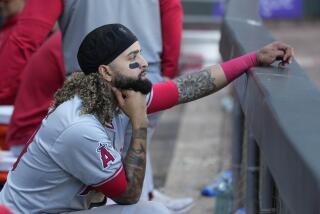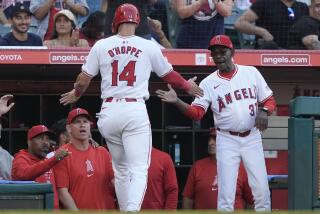Exhausted Baseball Negotiators Take a Seventh-Inning Stretch
On the verge of an armistice in baseball’s three-year labor war--or “peace in our time,” as a union lawyer called it--negotiators for owners and players yielded to exhaustion Saturday night.
Having bargained on an almost constant basis since late Friday morning, talks in New York were recessed in mid-evening Saturday.
They will resume about noon today, with likelihood of an agreement on a new labor contract before Monday.
“For the first time [since the process began], it smells good,” Donald Fehr, the union leader, said.
“We have sufficiently narrowed the differences that I would think we’re past the point of confrontation and threat.
“I’m satisfied that there’s been constructive bargaining.”
Said Randy Levine, management’s lead negotiator:
“There’s been a lot of serious negotiation and we’ve made significant progress. We still have issues to resolve, but we’re all too fatigued to go on. I’m hopeful we can continue toward closure tomorrow.”
An associate said he would be surprised if the unresolved issues prove to be deal breakers.
Said acting Commissioner Bud Selig, from Milwaukee: “The last day or two have been extremely constructive. Let’s hope it continues in that vein.”
A weekend settlement would carry historical significance, since Monday marks the second anniversary of the union’s 1992 walkout, triggering the 232-day strike.
Fehr updated his player representatives during a conference call Saturday, and the tone was upbeat and optimistic.
Tom Glavine of the Atlanta Braves said, “Based on everything they have told us, things are looking favorable for a settlement.”
Said John Franco of the New York Mets: “It’s the first positive phone call I’ve had in two years.”
In refining the key issues, this much became clear Saturday:
--The contract will cover six years, beginning technically with the current season and ending after 2001.
--There will be a payroll tax in 1997, 1998 and 1999, but not in 2000 or 2001.
--The tax will be about 35% on all payroll over about $51 million, with that threshold rising about 7% in 1998 and again in 1999. About five or six clubs would be affected per year.
--Players will be restored service time for the period they were on strike at the end of the 1994 season and the beginning of the 1995 season.
Among the players who will become six-year free agents at the end of the current season because of that restoration are Minnesota Twin second baseman Chuck Knoblauch, New York Met outfielder Bernard Gilkey and Chicago White Sox pitcher Alex Fernandez.
--The minimum salary will be raised from $109,000 to about $150,000, with incremental increases each year of the contract.
--Arbitration cases will be determined by a three-man panel rather than a single arbitrator.
Certain elements of those issues remain unresolved, but the framework is now in place, sources said.
In addition, the agreement may include the union’s approval of interleague play in 1997, the 1997 expansion of the divisional playoffs from five to seven games and an appeal by both sides to have Congress remove baseball’s antitrust exemption as it applies to labor matters.
Owners would still be allowed to control franchise movement under that limited change, but it would be easier for the union to challenge management’s labor decisions in court.
The threat by the owners to make a “last and final” offer next week and, if necessary, return to court to seek a lifting of the injunction that ended the strike March 31, 1995, by reinstating the expired work rules, seemed to spark the full-scale attempt to reach an agreement this weekend, although the sides had been narrowing differences during irregular but cordial talks since last November.
According to sources, Fehr, suspecting it would be difficult to get player support for another strike if owners successfully lifted the injunction and implemented their own work rules, went to Levine Friday morning and said, “Enough is enough with the threats, we’re ready to move if you’re ready to respond.” Both sides have.
(BEGIN TEXT OF INFOBOX / INFOGRAPHIC)
The Fine Print
Key labor issues remaining to to be finalized:
* LENGTH OF CONTRACT: Six years, starting in 1996 through 2001.
* PAYROLL TAX: 1997, ’98 and ’99 would include a tax of about 35% on payrolls of somewhere between $48 million and $51 million starting in 1997, with that threshold increasing 7% in ’98 and again in ’99. About five or six clubs per year would be taxed. The years 2000 and 2001 will be free of a tax.
* ARBITRATION: The union probably will agree to a three-man panel to decide arbitration cases rather than a single arbitrator. It is possible that the 20% lid on maximum pay cuts in arbitration could be removed or liberalized as a union trade-off for restoration of the service time that the players lost while on strike.
* SERVICE TIME: Time lost during the strike from August 1994 through the end of that season is expected to be restored. This will give a group of players that includes Chuck Knoblauch (Twins), Bernard Gilkey (Mets), Tim Naehring (Red Sox), Moises Alou (Expos) and Alex Fernandez (White Sox) enough service time to become free agents.
* MINIMUM SALARY: The union wants the minimum raised from $109,000 to $165,000 in 1997, to $175,000 in the next two years and to $200,000 in the final two years. The owners want no change in ‘97, followed by $150,000, $160,000, $165,000 and $175,000.
* REVENUE SHARING: The plan adopted by the owners to assist low revenue clubs will be phased in. The length and percentage of that yearly phase-in have been under negotiation. The union has argued that it’s the big revenue clubs that fuel the market, so that the money being taken from those clubs to help the small market clubs serves as a salary deterrent in itself and thus impacts the negotiations over the percentage and threshold of the payroll tax.
More to Read
Go beyond the scoreboard
Get the latest on L.A.'s teams in the daily Sports Report newsletter.
You may occasionally receive promotional content from the Los Angeles Times.





